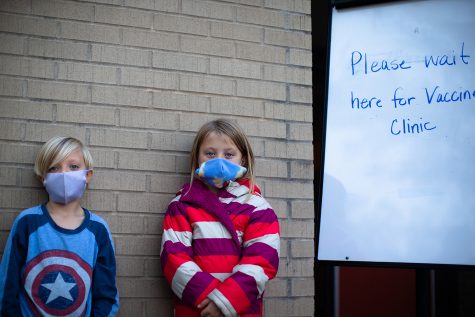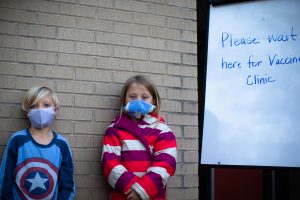Recipients of Johnson & Johnson COVID-19 vaccine could improve immunity with mRNA boosters, public health experts say
People who are eligible for the COVID-19 booster shots should get them as soon as possible to protect themselves against waning immunity, public health experts say.
A COVID-19 vaccination card is seen at Adler Journalism Building at the University of Iowa Monday, Oct. 11, 2021.
November 11, 2021
A few weeks after the Centers for Disease Control and Prevention cleared booster shots for Modena’s and Johnson & Johnson’s vaccine, public health experts suggest recipients of the Johnson & Johnson vaccine receive a booster of an mRNA vaccine for greater efficacy.
The CDC guidance authorizes people who are eligible for boosters to mix and match their vaccines, opening options to receive a different booster from their original vaccine series.
Stanley Perlman, University of Iowa Carver College of Medicine professor of microbiology and immunology, said Pfizer and Moderna have good efficacy, while the Johnson & Johnson vaccine is a little less efficacious. He said all the boosters work well, but the mRNA vaccines are the best option.
Even if people originally received the Johnson & Johnson vaccine, Perlman said an mRNA booster is more effective than the Johnson & Johnson booster.
According to the National Institutes of Health, the antibody responses are greatest for people who received a Moderna or Pfizer booster after receiving a Johnson & Johnson shot.
It’s important for people to get boosters to help themselves and their communities, Perlman said.
“It’s wise for people to be vaccinated. During the holiday season, people should be cautious around unvaccinated family members,” Perlman said. “If you aren’t vaccinated, you’re more likely to develop severe disease, be hospitalized, and die.”
According to the CDC, people who received an mRNA COVID-19 vaccine — Pfizer BioNTech or Moderna — and are 65 years and older, 50-64 years with underlying medical conditions, or 18 years and older who live in long-term care settings should receive a booster shot at least six months after completing the original two-dose vaccine series.
People who received the Johnson & Johnson vaccine and are 18 years and older should receive a booster shot at least two months after the original dose, according to the CDC.
Sam Jarvis, Johnson County Public Health community health division manager, said many people are experiencing waning immunity, meaning people who received the COVID-19 vaccine over six months ago are losing protective antibodies against the virus.
“Those at highest risk due to age, comorbidities, or living in a congregate facility should get boosters,” he said.
Each booster shot has a different level of efficacy and different requirements, Jarvis said.
Pfizer and Moderna are both mRNA vaccines, which teach people’s cells how to make a protein that will trigger an immune response in their bodies, according to the CDC. Although they use the same technology, Jarvis said the boosters are a little different because Moderna only has half of a dose in its booster shot.
The Johnson & Johnson vaccine is a viral vector, meaning it uses a modified version of the virus that is different from the one being targeted to deliver important instructions to cells, according to the CDC.
The best way to decrease the chance of severe infection and the rate of infection is through vaccination, Christine Petersen, director of the Center for Emerging Infectious Diseases in the UI College of Public Health, said.
“They decrease the rate of infection that you’re going to have overall, creating a phenomenon called herd immunity — you have less people in a population who can spread the virus, making the amount of spread within the community less,” Petersen said.
As of Nov. 9, according to the Iowa Coronavirus Dashboard, there have been 7,616 positive tests in the last seven days in Iowa, and there are currently 524 COVID-19 patients in the hospital.
Patients who aren’t fully vaccinated account for 85 percent of the COVID-19 patients in the Intensive Care Unit across the state and 71.6 percent of patients hospitalized with COVID-19.
Jarvis said everyone needs to return to wearing masks, practicing good hand hygiene, and getting the flu and COVID-19 vaccines.
“The pandemic isn’t over, and cases nationwide are starting to trend upward again,” Jarvis said. “People are less vigilant and not wearing masks as much, so it’s especially important to get vaccinated and maintain immunity.”


















